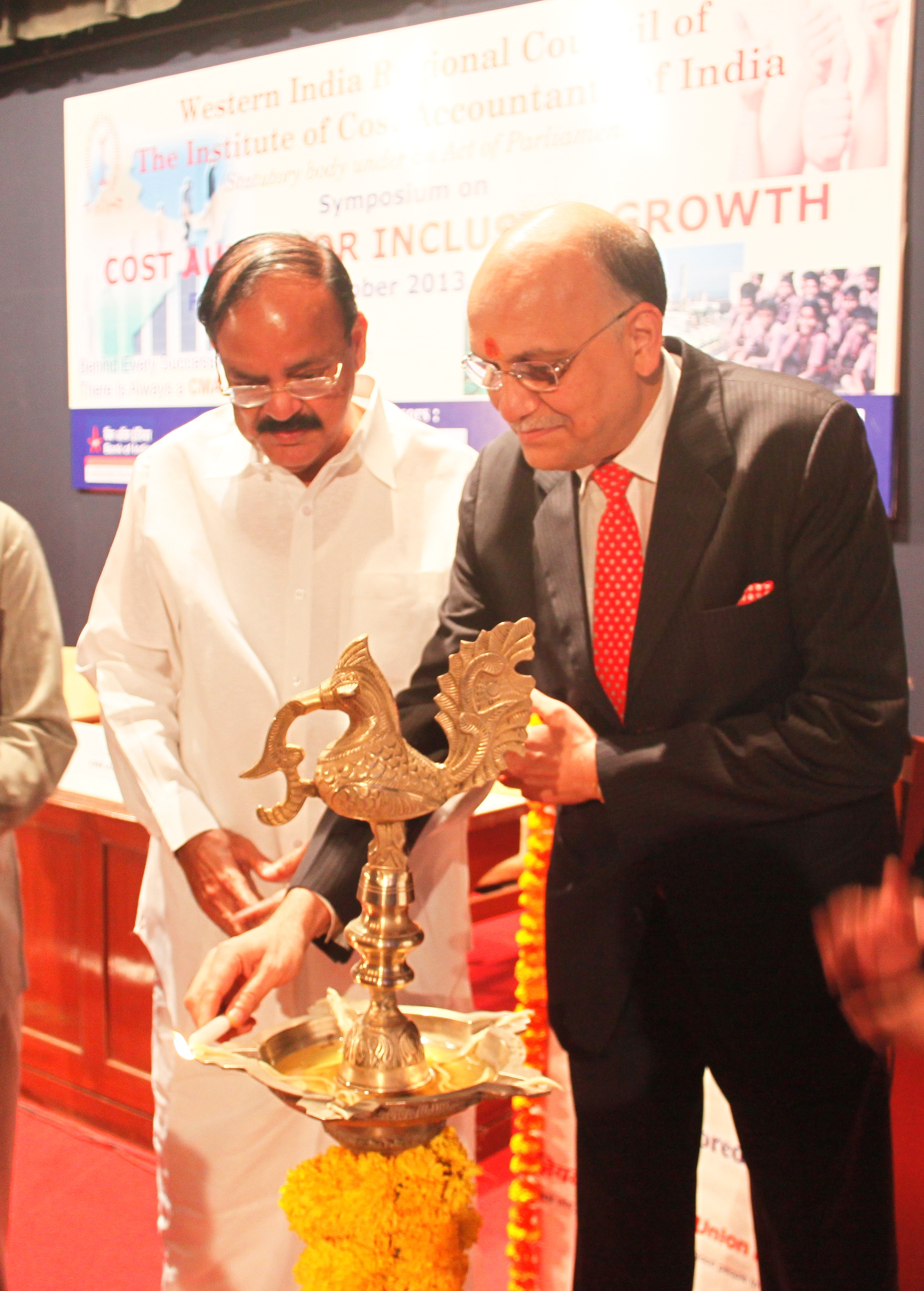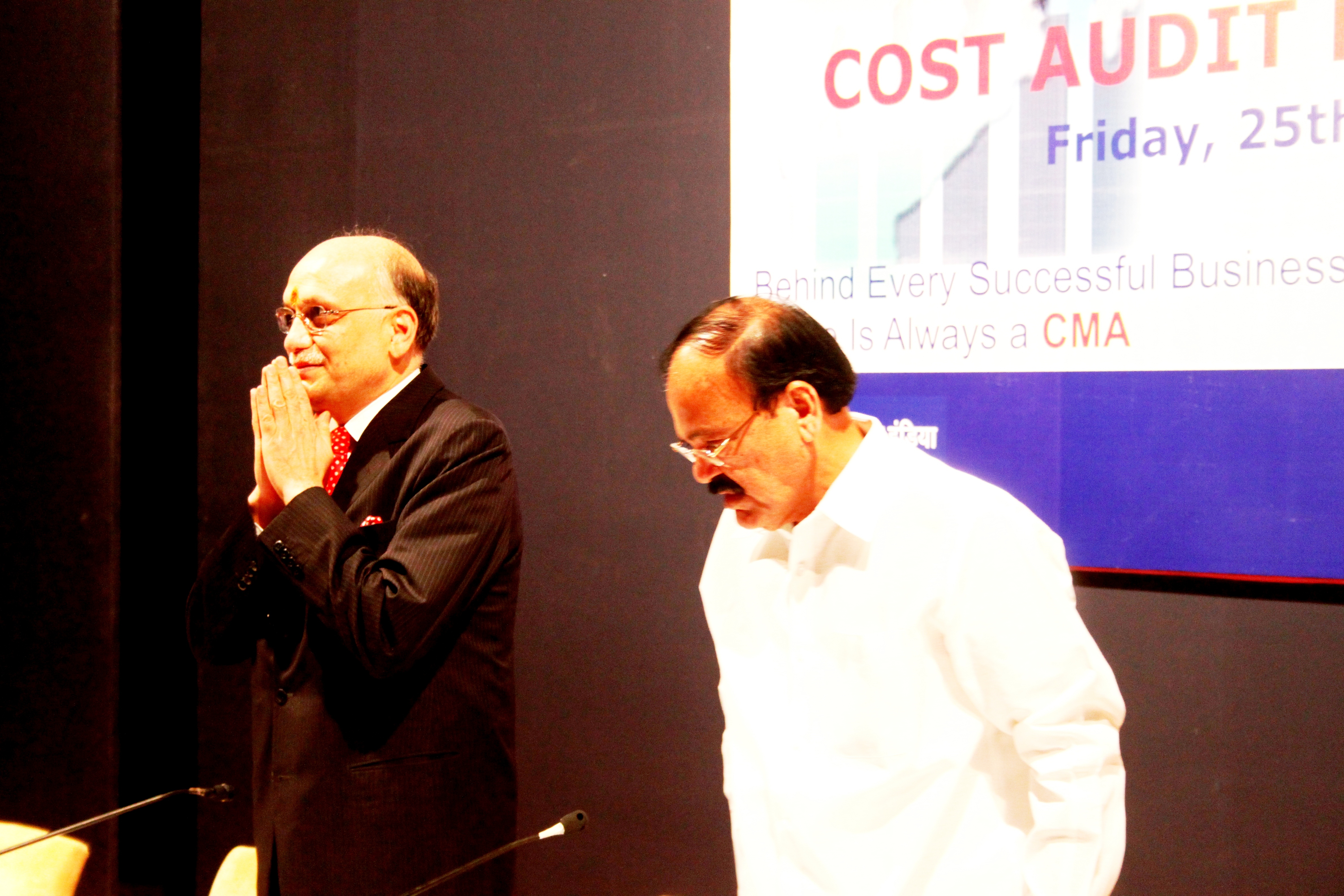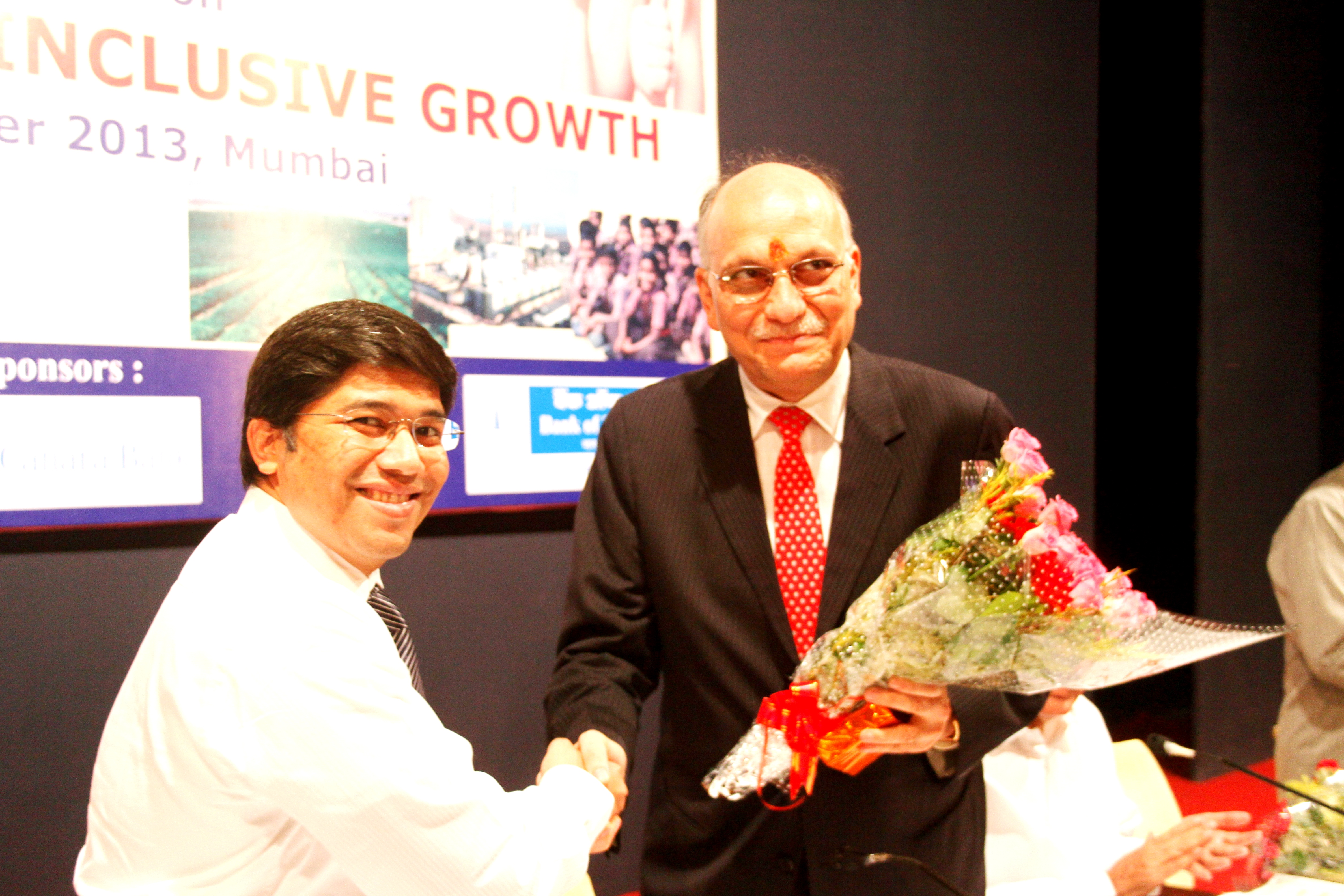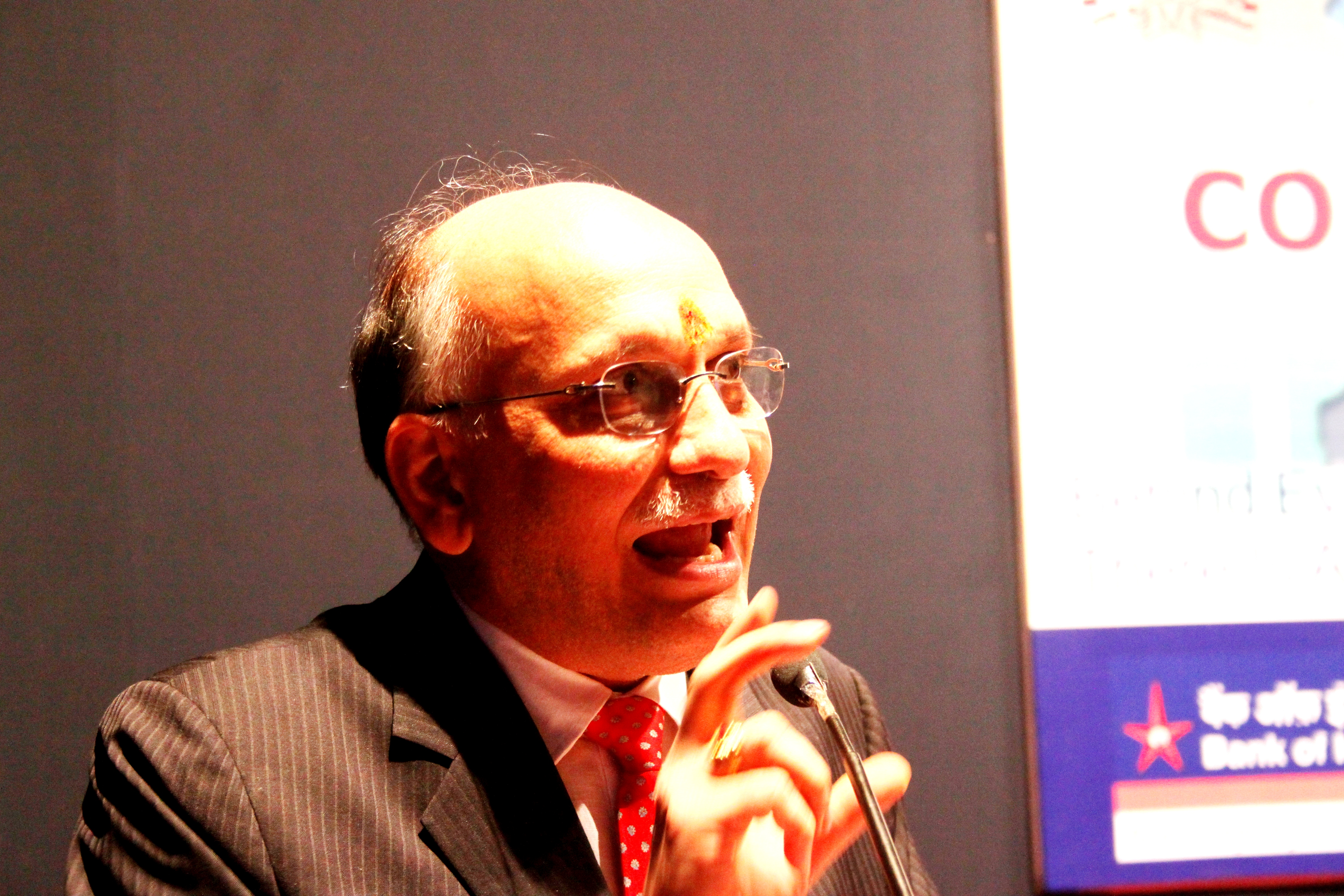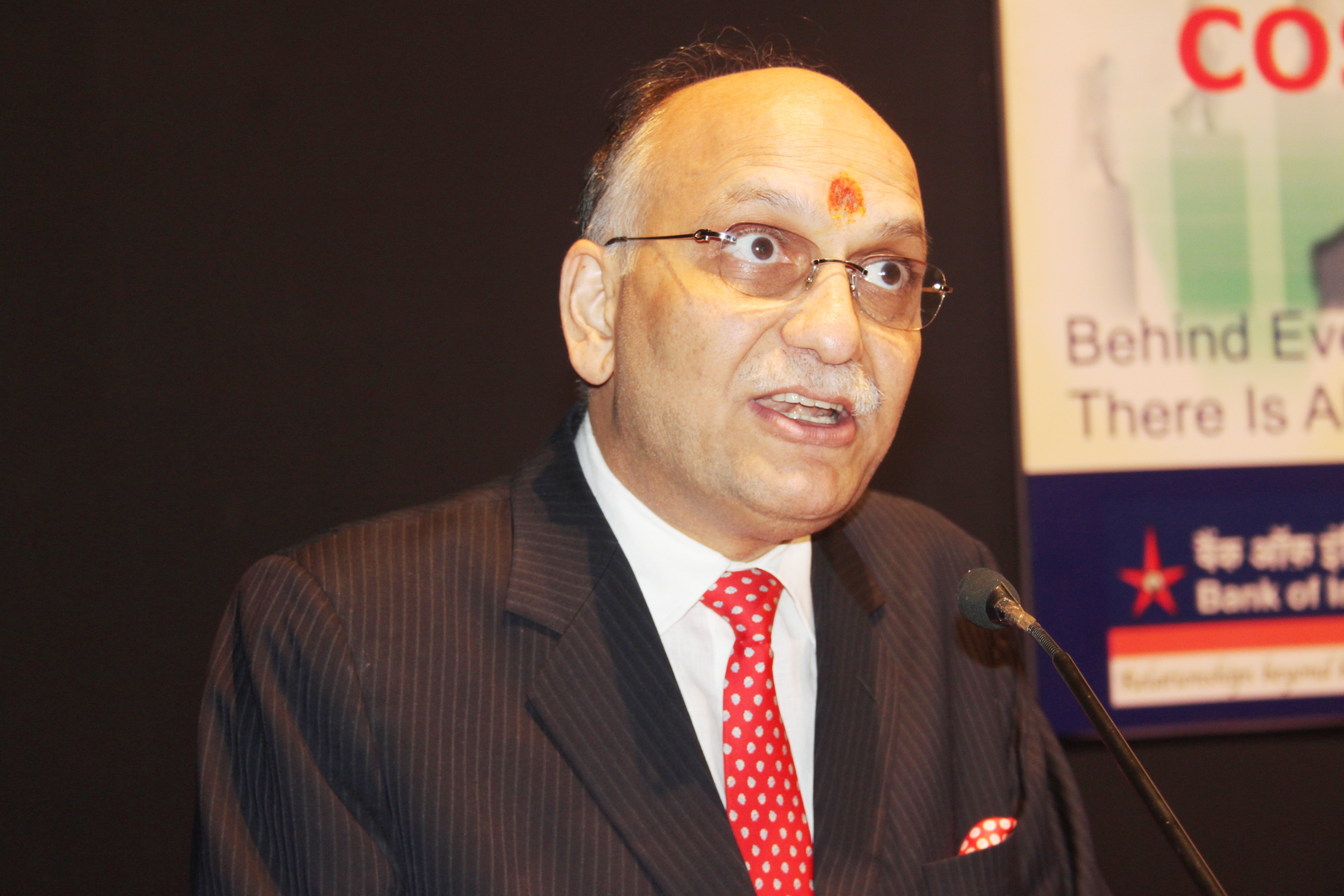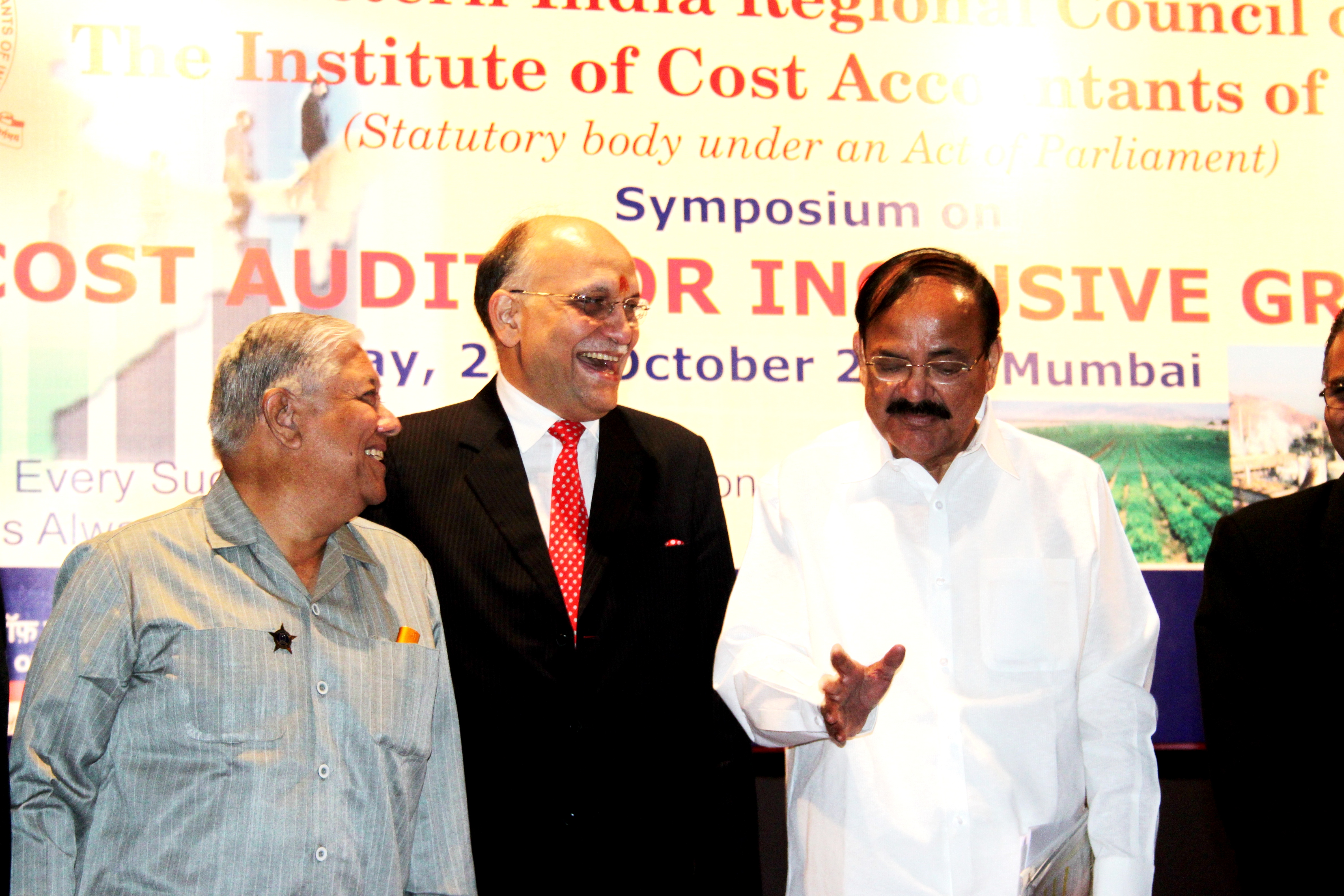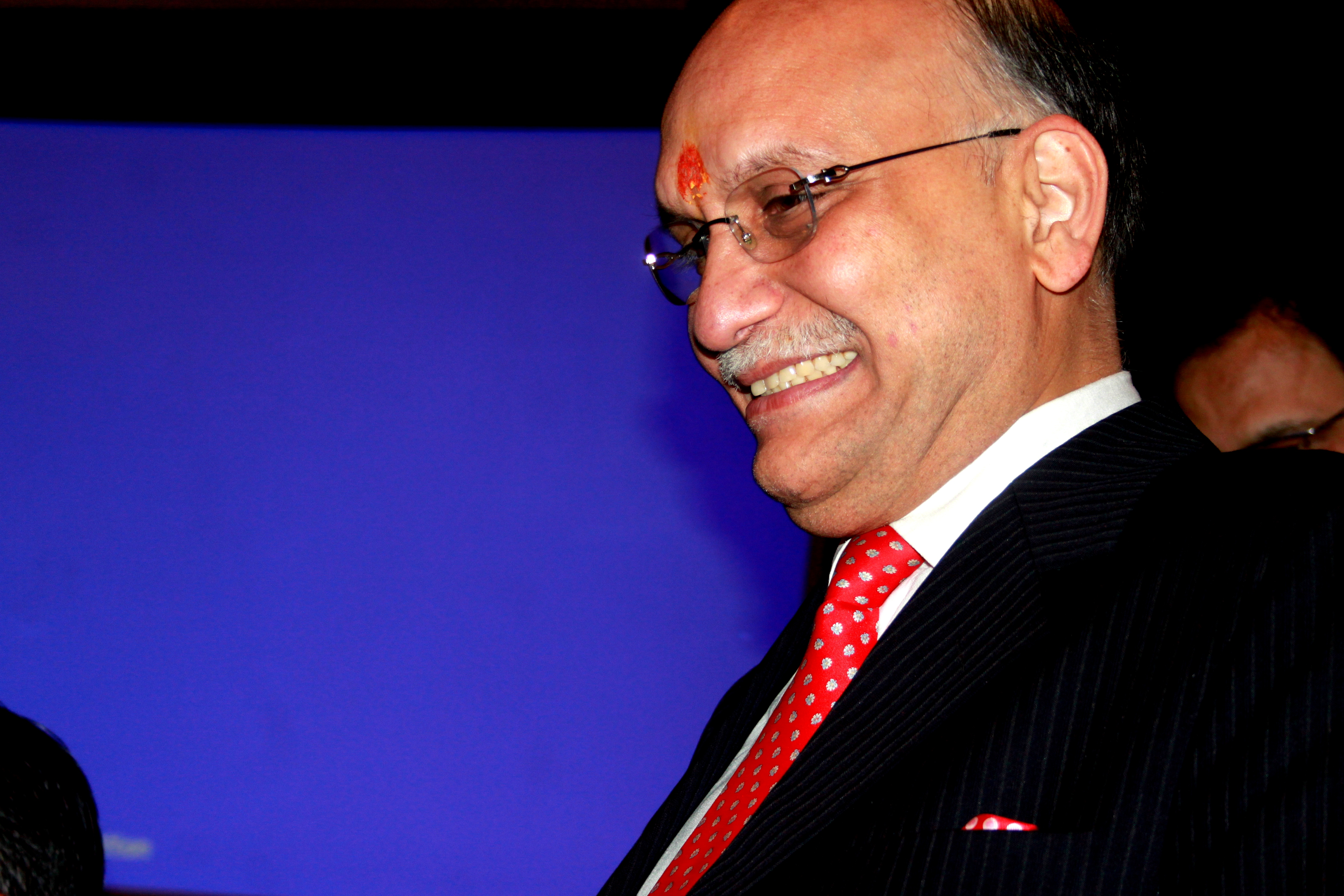Inaugural Speech delivered by Mr Pawan Kumar Ruia at a one-day symposium on ” Cost Audit for Inclusive Growth”, Organized by the Western India Regional Council of The Institute of Cost Accountants of India (ICAI)
(as prepared for delivery)
Friday, 25th October 2013 at Y.B. Chavan Auditorium, Mumbai
The 21st Century will belong to Cost and Management Accountants
Dignitaries on the dais, ladies, gentlemen and fellow cost accountants:
It is a great pleasure to be here with you, among comrades in arms, talking about things that are of interest to all of us. Today, we are in the threshold of change – of epoch making change – and I am as excited as all of you are, to be talking about the new vistas that we can all see opening before the world of us Cost Accountants, as it propels towards the very center of all economic functions en route to becoming the most important body of functional knowledge in the economic process. Cost Audit mechanism will increasingly contribute towards the progress and prosperity of the Indian economy aligned with the objective of inclusive growth.
Hunger, illiteracy, poverty, lack of sanitation, access to safe drinking water, deplorable levels of universal education, violence, corruption, political brinkmanship, climate change, global warming, insensitivity … the problems facing mankind are many. However, if we were to put on our caps as Cost Accountants, you will see what I see and hope that you too, will seek deliverance and solutions in the training that we have been privileged to have had. This is why, instead of the Auditing aspect, which to a layman has connotations of being reactive in nature, I feel that the focus of Costing should be proactive, and seek to look at inclusiveness in its light.
The biggest challenge before us today is to find ways and means of matching the world’s finite resources with man’s infinite wants. Petroleum has already breached peak oil, fossil fuels like coal are burning out – yet on the other hand, our demand for electricity, for cars, for industry, are showing no signs of abatement. On the contrary, as the BRIC countries gear up to unveil newer milestones in developmental economics, the demand for resources are witnessing a surge that has not been seen in any time in the history of mankind’s quest for betterment.
A family, an enterprise, an industry, an economy – from the man on the street to the country that comprises of people like him, it will not be an exaggeration to say that all economic activities everywhere have, in their core, costing. And when I say this, I do not merely mean fixed and variable costs, break even points, contribution and things that we have learnt to calculate with every breath we take. I am talking about Costing as the prime mover of tomorrow’s enterprise, as the Savior who will lead a resource hungry world order to its ultimate deliverance.
Robert Swan, the first person to walk to both poles, had made an interesting observation. He said: “The greatest threat to our planet is the belief that someone else will save it.”
So, we will not wait for someone else. Instead, we the Cost Accountants will set the ball rolling. And why Cost Accountants, if somebody asks, my answer would be that with skyrocketing demand and limited resources to meet the same, the need to analyse the cost to benefit ratios and arrive at quality decisions about use and allocation will come into sharper focus increasingly leading to us Cost Accountants getting the respect as the key constituent of the developmental process that is rightfully ours and ours alone.
Ladies & Gentlemen, perhaps, all of us would agree that today, the Indian economy is going through a tough phase where our overall growth scenario is moderating and inflation continues to remain above desired levels. We are at crossroads, and I believe the Institute of Cost Accountants has a huge role to play with regard to taking the Indian economy forward. To meet the 12th Five Year Plan’s objective of achieving an average growth rate of 8% or more, and to have a growth which is inclusive and sustainable in nature, it is extremely crucial and important to strengthen the cost competitiveness of Indian industry by effectively bringing in a cost management focus through adoption of best practices in cost management and cost auditing.
It is necessary for the Indian industry to become competitive by building abilities to acquire, assimilate, develop new technologies; reduce production costs; cut down delivery time; practice Total Quality Management; enhance productivity and customer service, and adopt forward-looking cost accounting and cost management practices. It is without any doubt that maintenance of appropriate cost accounting records by firms and effective cost audit will contribute to improving the competitiveness of the Indian industry.
I think Cost audit should be viewed as an instrument for continuous improvement. Cost audit must aim to provide an assurance to the management and the Government that the company is maintaining appropriate cost records as prescribed by law and to identify waste of resources, if any. Thus, it identifies processes and activities where improvements are necessary to optimise the productivity of resources. Cost audit report provides useful insights into the weaknesses in processes and activities and also provides inputs in formulating plans for continuous improvement in utilisation of resources.
Involving people into the Growth Process of the country by equitable allocation of resources to every section of the society calls for not only the product distribution at lower cost but also need-based cost effective product innovation and design at affordable cost where cost accounting fraternity could make a great contribution. The big part of the problem lies with the Companies which remain trapped in an outdated approach to value creation. They continue to view value creation narrowly, optimizing short-term financial performance. Companies must take lead in bringing business and society together. The solution lies in the principal of shared value which involves economic values in a way that also create society by addressing it by needs and challenges. Shared value is not social responsibility, but a new way to achieve economic success that drives inclusive growth.
The concept of shared value can be defined as policies and operating practices that enhance the competitiveness of a company while simultaneously advancing economic and social conditions in the communities in which it operates. Both economic and social progress must be addressed using value principles. Value is defined as benefits relative to cost, not just benefit alone. Value creation is an idea that has long been recognized where profit is revenues earned from customers minus the cost incurred. The value creation links companies operations with supply and demand chain management. The competitiveness involves operating at a lower cost where invaluable inputs from cost auditing could build the business model of a value chain where companies and societies are mutually benefited.
The greatest example I could think of is Mr. Sam Walton who started Discount Stores in a rural area of United States of America by the name Wal-Mart in 1960. This propelled the growth and involved almost every section of the society. One of the initiative Wal-Mart took by reducing packing and rerouting its trucks to cut 100 million miles from its delivery routes, saving 200 million dollars in cost.
There are examples where product innovation and research has led to unique product design for mass consumption substantially reducing the cost. Cost Accountants should get linked from the very innovation and research stage in this process. Under the absolute definition of Inclusive Growth, Smart Phones, Televisions, Alternative Energy are great innovative products specially designed which could propel the inclusive growth.
The role of Cost Audit shall not only be confined to routine audits as prescribed under General Accepted Accounting Principles by Institute of Cost Accountants of India but also get into the area of internal control systems, modifying / improving production and business processes, supply and demand chain management. Activity based costing has not been successfully practiced by Indian companies which is currently getting replaced by Time-driven Activity Based Costing introduced by Harvard Business School. Many Fortune 500 Companies globally including General Motors, Apple Computer, Dell Computers have reduced the cost significantly mainly by managing supply chain management efficiently. The Just-In-Time inventory introduced by Toyota Motors has gone a long way in reducing the carrying cost of inventory and managing supply chain efficiently. The Cost Audit should also address and examine the business intelligence system and inject cost analysis information and data for effective cost controls. Businesses must be technology driven and the role of management accountants are to ensure that proper information management systems are in place which address each aspect of operation, transaction and non-transaction data, competitors analysis. The management accountant should also ensure integration of the information management system to mobile devices and smart phones for real time location and tracking of product movement in supply and demand chain system. Needless to say time driven activity based costing essentially needs implementation for correct decision making process.
The biggest example of a product design, innovation at a zero cost to the customers is Google founded by Larry Page when he was at the Stanford University in USA. This has reached almost every corner globally and engaged people at every level. By offering free product the management was able to offset the cost and make profit by advertising revenue from one section of the society. Mark Zuckerberg of Facebook and Google which are the best examples suggesting absolute definition of inclusive growth where the companies made product available at a zero cost to everyone and created a business model by offsetting their cost by advertising revenues.
Cost Audit alone may address inclusive growth, however for the inclusive growth to be effective Cost Accountants in addition to their role defined in Accounting Standards should work closely with Research and Development department and more importantly with Marketing team of the company. The most successful airline globally in terms of real inclusive growth currently is the Air-Asia from Malaysia which has operations in many countries. The costing team of this airline worked hand-in-hand with research and innovation department of the airline and the marketing function of the airline has dedicated Cost Accountants. When the company examined the concept of Blue Ocean Strategy introduced by one of the world top business school INSEAD, the Cost Accountants were involved in analyzing the marketing strategy of the airline for implementing this strategy.
Let us approach the issue from a different level now – and in doing so, let me share a few personal experiences:
Cases of Falcon Tyres and a UK outfit cited extempore.
That day was the proudest day of my life as an Indian standing before a people who had not only ruled over us for nearly two centuries but had also introduced modern business to our country.
I also thanked myself for taking a right decision in the late 70’s to have become the most proud member of the Institute as, when I had started pursuing Costing for proper management accounting.
The lessons are clear: we have to change the way we see ourselves and the things around us. We have to stop viewing ourselves as mere men and women armed with calculators doing our jobs. We have to reinvent ourselves as the Agents of Change in the process of wealth creation, adding value to life itself. Join me, my friends as I say,
“We have not inherited the Earth from our forefathers, we are the custodians of the Earth and all its resources for our children. We are the center of the creative force of the universe and on us is the onerous task of ensuring that we leave behind for the children of tomorrow a cleaner, greener and more prosperous world order.”
Friends, it is easier said than done. And, the key to this tectonic shift is in our mind. We have to tell ourselves that we are not mere cogs in the wheel doing our bit, but are the life force that drives the wheel forward.
On this note, I would like to make two appeals to the competent authorities from this esteemed forum:
- Make Cost Audit mandatory, across the board, just like Financial Audit and make it a part of the Annual Report to be approved by the Shareholders as a Statutory compliance. Even if this is at the cost of competitiveness and price sensitivity, it should be allowed for the sake of Inclusive Growth.
- In the fast flattening world of globalization I will urge you to work towards a regime of uniformity and synergies in Costing and Cost Auditing across countries and regions.
In the context I must appreciate the tremendous amount of good work that is being done by the Institute. Over the years, the Institute has significantly contributed towards growth of the industrial and economic climate of the country, and has played a key role in developing the Cost and Management Accountancy function as a powerful tool of management control in all spheres of economic activities.
The institute has not only excelled in its pursuit of Inclusiveness, but also in the way it has reached out and embraced the fraternity around the world which has ensured a global reach and collaboration in the field of data, knowledge and expertise access, sharing and utilization. It is worth mentioning here about the MOUs with the Omar Zawawi Establishment LLC (OMZEST), Oman; Institute of Professional Accountants and Auditors of Russia (IPAR); National Institute of Accountants, Melbourne, Australia, among others. I believe all these moves will strengthen the ICAI’s role in the Indian economic & policy-making circles.
Cost Audit, as I mentioned earlier is the main driver of the economic process but is yet to get the recognition it deserves.
Friends, Costing is like a Mother in more ways than one. She knows that the onion prices are shooting through the roof much before the father sees it on television news. She knows the exact amount of the school fees, tuition fees and bus fees of the children and remembers the payment schedules. She knows how many subsidized gas cylinders have been consumed this year and exactly how many are due. She knows the wages of the household aides and also knows who deserves a hike and when. She remembers that the ensuing family marriages need to be provided for. She keenly watches the health of the family elders and knows if it is time to consult an expert. The options are innumerable – the permutations and combinations mind boggling and cost consciousness is ingrained in everything she does. She is not swayed by the motive of profitability and does everything with the achievement of the greatest common good being the prime mover. And, the result? The father is considered a super-success in managing the family when the mother assumes her role to perfection. But isn’t it time to acknowledge the larger role a mother instead of restraining her to the precincts of a homemaker? Costing deserves that acknowledgement.
Friends, I am also a member of other Institutes, just like I am a member of yours. I say this because I want to share a vision with you today. As I stand here, I see a future world order where Costing will play the role of pre-eminence in man’s quest for economic development. All of you are aware of the epoch making changes that our discipline is going through and I will not waste your time elaborating on them. Suffice to say, Cost Accountancy as a calling, as a profession is set to emerge as the most potent tool in the hands of economic man – if the 19th century belonged to free enterprise led by the faculty of management and the 20th century to our brothers, the Chartered Accountants who built on the foundation created by our forefathers, the 21st century is certain to belong to us as we help the World, grappling with finite resources and infinite demand to rationalize its production processes, armed with the knowledge of costing. That is why at the very outset I announced that the 21st century belongs to the Cost and Management Accountants.
On that note of optimism, let each one of us take the vow to go back and do our little bits to ensure that the writing on the wall is crystal clear: Cost Rules. O.K!
Thank You,
Pawan Kumar Ruia
You can follow Mr. Pawan Kumar Ruia in Twitter : @PawanRuia
Noted Parliamentarian and BJP leader Mr Venkaiah Naidu was the Chief Guest at the event – Editor

